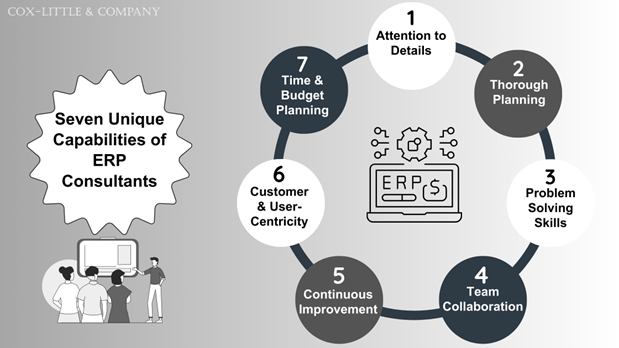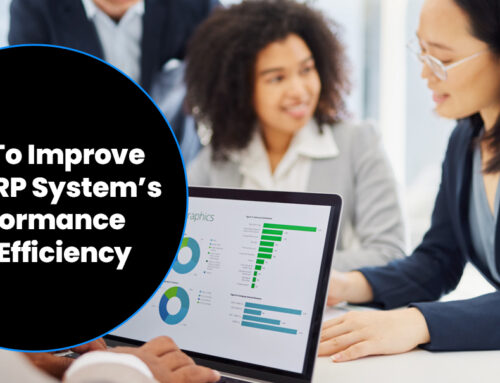
Did you know that 78% of companies use some type of ERP consultant? According to the Panorama Consulting Group ERP Report, about 52% of companies are satisfied with the ERP system implementations. Almost 51% of companies sought the help of external consultants to overcome organizational change. A whopping 90% of the dependencies were for ERP implementation, 46% for technology assessments, and 41% for reengineering and business process management. This was the story about four years ago when the world was on the cusp of the COVID-19 pandemic and the enormous toll of digital transformation. Even in 2024, the risk of ERP failures cannot be ruled out. A Deloitte survey showed that nearly 55% to 75% of ERP projects fail to fulfill their set goals. Organizations across industries need the support of ERP consultants to eliminate inhibitors to successful ERP implementation.
In the U.S., ERP consultants work with firms with 50 to 10k employees across the technology, professional services, Fortune 500, manufacturing, finance, and transportation industries. A look back at the recent past reveals many stumbling blocks to ERP initiatives. At the same time, ample ERP talent in the country gives a solid footing to kick off ERP projects with clarity and insurance.
In our previous blog, we explored the types of ERP consultants and their critical role in driving ERP projects. As we begin 2024, we aim to help businesses build deeper cognizance of their ERP journeys and have sufficient backing to plan and pursue realistic goals using ERP systems. At the end of the day, ERP software implementation, customization, integrations, and more are not just another IT project for your business.
Here’s a quick download of the insights of our ERP consultants on how firms of all sizes and their CXOs can count on their expertise to fulfill ERP objectives within the timeframe and budget.
Seven Unique Capabilities of ERP Consultants

- Attention to Details: The expression, ‘the devil is in the details’ holds true in ERP projects. Let’s say your company’s project managers and IT teams are involved in overseeing ERP software implementation. Their time, communication, and bandwidth are limited to liaise with external stakeholders like ERP vendors, service providers, or even the internal departments within the organization. Deep project engagements would mean getting into a ‘rabbit hole’ of overwhelming details. It eats away the time and involves a very high risk of errors and misjudgments.ERP consultants specialize in selecting the right ERP software and are aware of their capabilities and benefits relevant to the business. For instance, an ERP consultant would know how to identify and eliminate redundant business processes by leveraging integration with specific business applications. They would know the right kind of user roles, workflows, and permissions to set up for seamless and secure user access. ERP consultants can even recommend what type of ERP configurations help improve user experiences. The knowledge of the ERP’s technical, operational, and process aspects and its implementation, integration, and other processes differentiates an ERP consultant from a regular IT staff.
- Thorough Planning of ERP Projects: From the initial ERP selection stage to planning throughout the project lifecycle, ERP consultants are entrusted to work closely with stakeholders and end-users to map requirements, project scope, module selections, architecture, and product customizations, data migration, configurations, and set up and much more. Detailed planning at every stage of the ERP implementation journey or project sets the tone for the organization regarding the level of disruption and change they can expect.Planning and assessments in ERP endeavors reduce unpredictability. It takes more than just having a checklist; ERP consultants’ role in planning ERP projects helps provide objective guidelines for the organizations and their stakeholders to follow through the process without delays or budget overruns.
- Problem-Solving Skills: Remember the famous ERP rollout disasters? A global distributor of fresh produce saw a disastrous turn after implementing new ERP software. They could not keep track of their inventory of perishables that became unfit for sale. Another protective packaging brand’s ERP rollout took over a year, exceeding the planned budget due to supply chain disruptions caused by the Russia-Ukraine conflict. There are several examples of high-profile ERP failures. Ultimately, most of these brands turned to third-party consultants to sort out the ERP issues.When it comes to ERP planning, nothing is ever set in stone. An experienced ERP consultant or professional always makes room for unforeseen events. Any situation, technical or macroeconomic-driven, has the potential to snowball into issues that impact an ERP project at any stage. They surface as issues like system incompatibility, customization overkill, poor data governance, inaccurate testing, inadequate change management, and insufficient training and support. These situations require a reactive approach that does not disrupt the whole organization and allows for timely remediations. Experienced ERP consultants would know how to crunch complexities with their problem-solving skills and ability to build strategies that can realistically adapt to the unexpected.
- Team Collaboration: The ability to bring all stakeholders together and reach their collective consensus is a commendable people management skill of ERP professionals. A prudent ERP consultant communicates effectively about the ERP project with all stakeholders, teams, and end-users to drive transparency and collaboration. ERP systems centralize data and systems, and an ERP consultant helps consolidate teams and stakeholders by working closely with them to collate detailed requirements, communicate project scope, and proactively assist in ERP software selection, evaluation, configurations, go-live support, and more.
- Continuous Improvement: ERP projects are not one-time events. ERP software is not a typical on-time plug-and-play solution. After the go-live, organizations must adopt a continuous improvement approach to maximize ERP system value. Continuous improvement plans help achieve outstanding goals from the ERP implementation phase and iterate resources, processes, and workflows to adapt to organizational change. It also helps engage in system upgrades, patches, and the addition of new functionality and features.Only an ERP consultant can dedicate entirely to continuous improvement of the ERP system by helping teams prioritize actions and evaluate opportunities for processes, user experience, and operational improvements. Besides, an ERP professional would know when to tread ahead towards upgrades based on their knowledge of current ERP and technological trends
- Customer and User-centricity: ERP software helps reduce operational costs by 23%, suggests ERP research data. However, even after implementation, nearly 82% of employees resist change, impacting user adoption rates within the organization. Poor user adoption is attributable to insufficient training and support, lack of understanding of the new ERP system and functions, complicated user interfaces, and ERP configurations with high learning curves. Low user adoption is a barrier to achieving good employee and customer experience. ERP consultants are adept in identifying the root cause of the issue and elevating end-users confidence to leverage the ERP software with effective training and refresher training even beyond the implementation stage. They help simplify end-users and even customers’ journeys across the ERP platform and integrated business applications, boosting user and customer-centricity.
- Time and Budget-friendliness: In 2022, only 59% of organizations completed their ERP projects within the planned budget, according to ERP research by Panorama Consulting Group. Another 15% of ERP users claimed that the ERP service providers did not deliver the required functionality on time. The reasons for budget and time overruns include data complexities, resource limitations, unrealistic project timelines, and more. The same study also highlighted that 78% of firms sought the help of external ERP consultants to overcome common ERP-related problems. ERP consultants know how to help organizations plan and execute projects and align them with goals and strategies without jeopardizing budgets and timelines.
Let’s Plan for 2024: Talk to Our ERP Consultants
At COX-LITTLE & COMPANY, we have learned from over three decades of experience in delivering IT services, including ERP staffing solutions, to a diverse clientele that a combination of ERP software and ERP expertise is ‘pure alchemy’ for driving business innovations. Our experts can demonstrate tangible business outcomes with well-planned ERP implementation methodology and relevant insights from deep industry experience.
Contact our team today and discuss your ERP journey for 2024!





